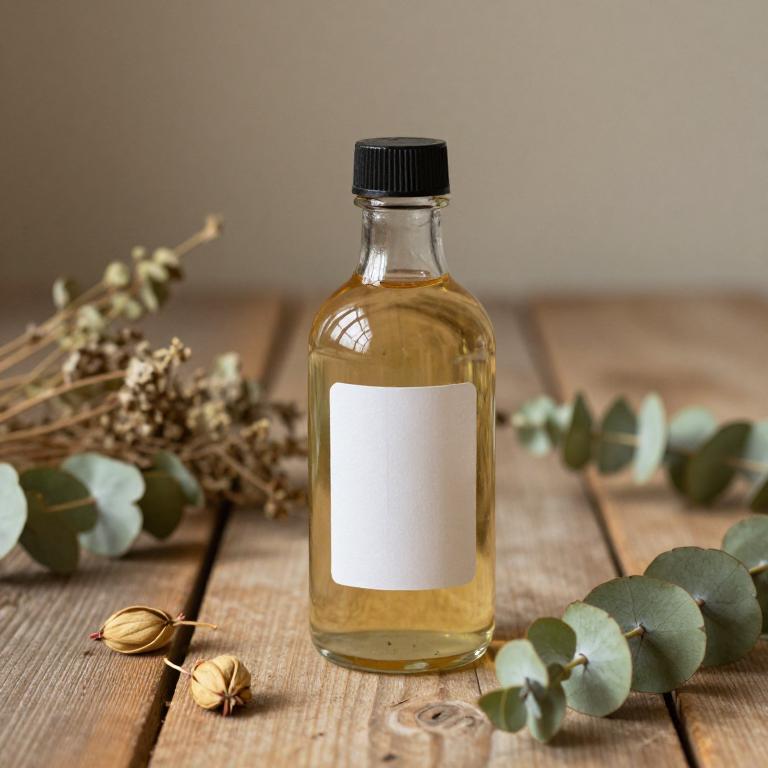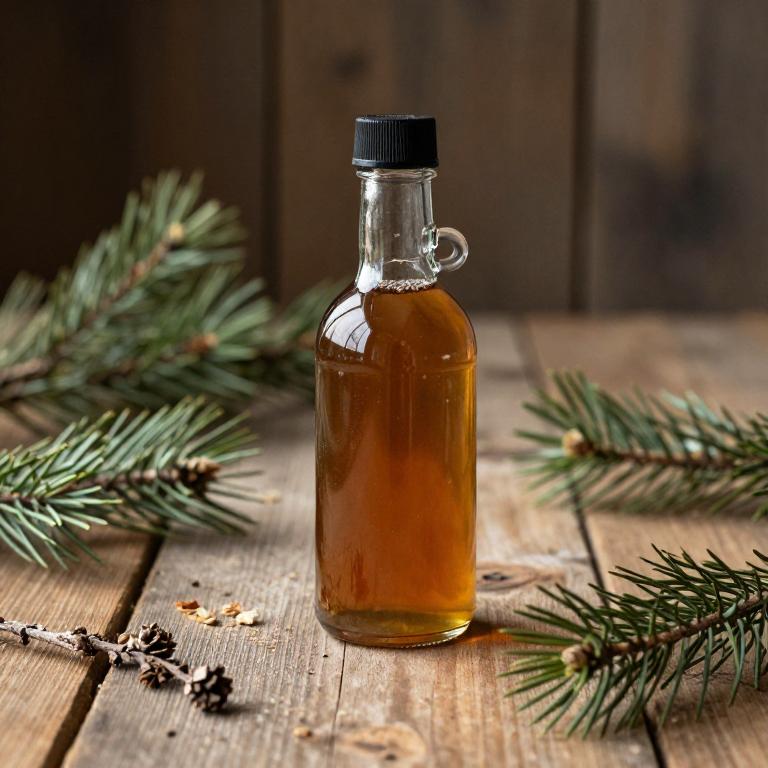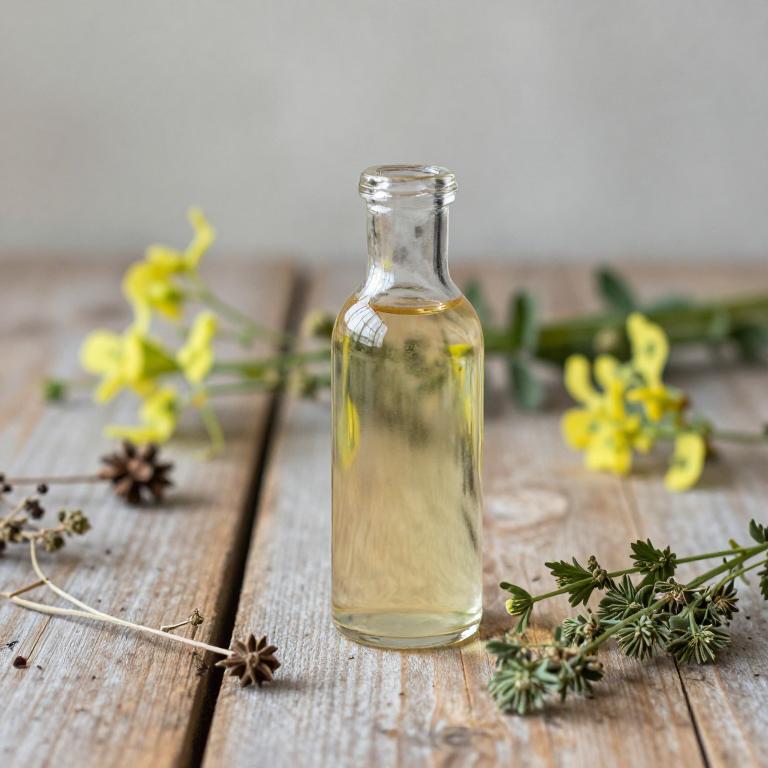10 Best Herbal Syrups For Phlegm

Herbal syrups for phlegm are traditional remedies often used to help alleviate symptoms of respiratory congestion by thinning mucus and making it easier to expel.
These syrups typically contain natural ingredients such as thyme, eucalyptus, ginger, and ivy, which are known for their expectorant and anti-inflammatory properties. They are commonly recommended for individuals suffering from colds, bronchitis, or other respiratory conditions that produce excess mucus. Unlike some pharmaceutical cough medications, herbal syrups are generally considered safe for long-term use and can be a gentle alternative for children and adults alike.
However, it is important to consult a healthcare professional before using these syrups, especially if you have underlying health conditions or are taking other medications.
Table of Contents
- 1. Eucalyptus (Eucalyptus globulus)
- 2. Licorice (Glycyrrhiza glabra)
- 3. Thyme (Thymus vulgaris)
- 4. Ginger (Zingiber officinale)
- 5. Fennel (Foeniculum vulgare)
- 6. Peppermint (Mentha piperita)
- 7. Scots pine (Pinus sylvestris)
- 8. Parsley (Petroselinum crispum)
- 9. Salvia (Salvia officinalis)
- 10. Rosemary (Rosmarinus officinalis)
1. Eucalyptus (Eucalyptus globulus)

Eucalyptus globulus, commonly known as the Tasmanian blue gum, is widely used in herbal syrups to help alleviate symptoms of respiratory congestion and phlegm.
These syrups often contain extracts from the leaves of the eucalyptus plant, which are rich in compounds like eucalyptol that have expectorant and anti-inflammatory properties. The expectorant action helps loosen mucus in the respiratory tract, making it easier to expel phlegm. Herbal syrups made from eucalyptus globulus are typically used for conditions such as bronchitis, colds, and sinusitis.
However, they should be used with caution, especially in children and individuals with asthma, and it is advisable to consult a healthcare professional before use.
2. Licorice (Glycyrrhiza glabra)

Glycyrrhiza glabra, commonly known as licorice, has been traditionally used in herbal medicine for its expectorant properties, making it a popular ingredient in syrups designed to help alleviate phlegm.
The active compounds in licorice root, such as glycyrrhizin and flavonoids, are believed to stimulate the secretion of mucus and loosen congestion in the respiratory tract. When incorporated into herbal syrups, glycyrrhiza glabra can help reduce the viscosity of phlegm, making it easier to cough up and clear from the airways. However, prolonged use of licorice-containing syrups may lead to side effects such as hypertension and electrolyte imbalances due to its effects on the adrenal glands.
As a result, it is often recommended to use licorice-based syrups under the guidance of a healthcare professional, especially for individuals with existing health conditions.
3. Thyme (Thymus vulgaris)

Thymus vulgaris, commonly known as thyme, is a popular herb used in the preparation of herbal syrups to help alleviate symptoms of phlegm and respiratory congestion.
The essential oils in thyme, particularly thymol, possess strong antimicrobial and expectorant properties that can help loosen mucus and reduce its thickness in the airways. These syrups are often used in traditional medicine to support the body’s natural ability to clear respiratory secretions. When taken as directed, thyme-based syrups can provide relief from coughs and sore throats associated with excess phlegm.
However, it is important to consult a healthcare professional before use, especially for children or individuals with known allergies or medical conditions.
4. Ginger (Zingiber officinale)

Zingiber officinale, commonly known as ginger, has been traditionally used in herbal medicine for its expectorant properties, making it a popular ingredient in syrups designed to help alleviate phlegm.
These syrups often combine ginger with other herbs like licorice root or eucalyptus to enhance their effectiveness in loosening mucus and promoting easier breathing. The active compounds in ginger, such as gingerol and shogaol, are believed to stimulate the production of digestive enzymes and reduce inflammation in the respiratory tract. Herbal syrups containing zingiber officinale are generally considered safe for most adults and may offer a natural alternative to over-the-counter cough medications.
However, individuals with gastrointestinal issues or on blood-thinning medications should consult a healthcare provider before use.
5. Fennel (Foeniculum vulgare)

Foeniculum vulgare, commonly known as fennel, has been traditionally used in herbal medicine for its expectorant properties, making it a popular ingredient in herbal syrups for alleviating phlegm.
The essential oils in fennel, particularly anethol, help to loosen mucus and promote easier expectoration, providing relief from respiratory congestion. These syrups are often used to treat symptoms of coughs, colds, and bronchitis by reducing the thickness of phlegm and supporting respiratory health. Fennel-based syrups are generally considered safe for most adults and children when used as directed, though they should be avoided in cases of known allergies or during pregnancy without medical advice.
Overall, foeniculum vulgare herbal syrups offer a natural and effective alternative for managing phlegm-related respiratory discomfort.
6. Peppermint (Mentha piperita)

Mentha piperita, commonly known as peppermint, is often used in herbal syrups to help alleviate symptoms associated with excess phlegm.
These syrups work by stimulating the mucous membranes and promoting the expulsion of mucus through expectoration. The cooling and soothing properties of peppermint can help reduce throat irritation and make coughing more productive. Peppermint herbal syrups are typically made by combining fresh or dried peppermint leaves with honey or other natural sweeteners.
They are a popular choice for individuals seeking natural remedies for respiratory congestion and mild respiratory conditions.
7. Scots pine (Pinus sylvestris)

Pinus sylvestris, commonly known as Scots pine, has been traditionally used in herbal medicine for its expectorant properties, making it a valuable ingredient in syrups designed to help clear phlegm from the respiratory system.
The essential oils derived from the needles of the Scots pine contain compounds such as alpha-pinene and camphor, which are believed to stimulate mucus production and loosen congestion in the airways. These herbal syrups are often used to alleviate symptoms of coughs, colds, and bronchitis by promoting easier expectoration. The soothing and anti-inflammatory effects of Pinus sylvestris contribute to its effectiveness in supporting respiratory health.
As a natural remedy, these syrups are favored by those seeking alternative or complementary treatments for phlegm-related respiratory issues.
8. Parsley (Petroselinum crispum)

Petroselinum crispum, commonly known as parsley, has been traditionally used in herbal medicine for its potential respiratory benefits.
When prepared as a syrup, parsley can help to loosen and expel phlegm from the respiratory tract due to its mild expectorant properties. The syrup is often made by combining fresh or dried parsley with honey or other natural sweeteners to enhance flavor and potency. This herbal remedy is believed to support cough relief and improve overall respiratory comfort.
However, it is important to consult a healthcare professional before using parsley syrup, especially for individuals with allergies or chronic respiratory conditions.
9. Salvia (Salvia officinalis)

Salvia officinalis, commonly known as sage, has been traditionally used in herbal medicine for its potential respiratory benefits, including its role in managing phlegm.
Herbal syrups made from sage are often prepared by combining the dried leaves with honey or other sweeteners to create a soothing and aromatic preparation. These syrups are believed to help reduce mucus production and ease congestion by acting as a mild expectorant. Sage contains compounds such as flavonoids and rosmarinic acid, which may have anti-inflammatory and antimicrobial properties that support respiratory health.
While generally considered safe, it is advisable to consult a healthcare professional before using sage syrup, especially for individuals with allergies or those taking other medications.
10. Rosemary (Rosmarinus officinalis)

Rosmarinus officinalis, commonly known as rosemary, is often used in herbal syrups to help alleviate symptoms associated with phlegm and respiratory congestion.
The essential oils in rosemary, particularly cineole and camphor, possess expectorant properties that can help loosen mucus and make it easier to expel from the respiratory tract. These syrups are typically prepared by infusing rosemary leaves in a base of honey or glycerin, enhancing their soothing and antimicrobial effects. They are often recommended for use in cases of bronchitis, coughs, and other respiratory ailments where excess mucus is a concern.
However, individuals with allergies to plants in the Lamiaceae family should use these syrups with caution and consult a healthcare professional before use.